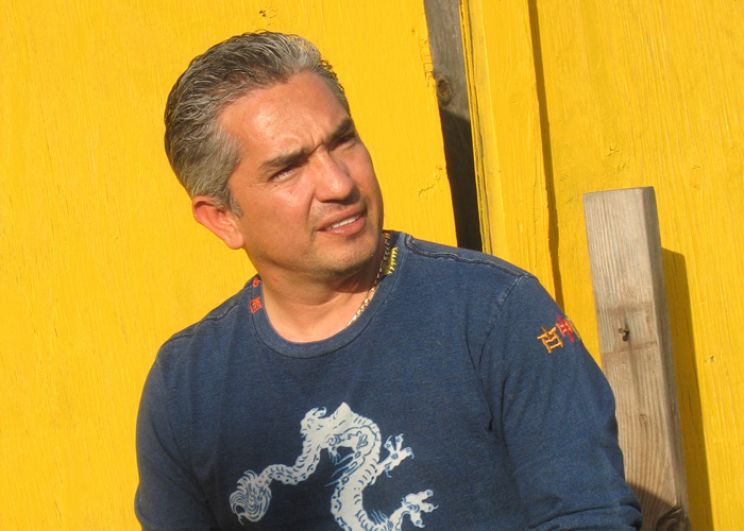Cesar Millan ethnicity is a topic of interest for many dog lovers and fans of the world-renowned Dog Whisperer. Known for his exceptional skills in dog behavior and training, Cesar Millan has captured the hearts of millions worldwide. But beyond his professional achievements lies a rich cultural background that has shaped who he is today. In this article, we will delve into Cesar Millan's ethnicity, exploring his roots and how they have influenced his life and career.
As a prominent figure in the world of dog training, Cesar Millan's story goes beyond the screen. His journey from humble beginnings in Mexico to becoming a global icon is both inspiring and fascinating. Understanding his ethnicity provides a deeper appreciation of the values and principles that guide his work with animals.
This article will take you on a journey through Cesar Millan's life, from his early years to his rise as a leading authority in dog behavior. We will explore the cultural influences that have played a significant role in shaping his methods and success. Let's begin by examining the details of his ethnicity and how it has contributed to his unique approach to working with dogs.
Read also:Harry Connick Jr Family Pictures A Closer Look At His Life Love And Legacy
Table of Contents
- Biography
- Early Life and Background
- Overview of Cesar Millan's Ethnicity
- Cultural Impact on His Work
- Professional Career and Achievements
- Training Methods and Philosophy
- Family Roots and Ethnic Background
- Cultural Heritage and Traditions
- Personal Life and Influences
- Conclusion
Biography
Who is Cesar Millan?
Cesar Millan, often referred to as "The Dog Whisperer," is a Mexican-American dog behaviorist and television personality. Born on August 27, 1969, in Culiacán, Sinaloa, Mexico, Millan has become a household name for his groundbreaking work in understanding and training dogs. Below is a summary of his key personal details:
| Full Name | Cesar Enrique Millan |
|---|---|
| Date of Birth | August 27, 1969 |
| Place of Birth | Culiacán, Sinaloa, Mexico |
| Profession | Dog Behaviorist, Television Personality |
| Nationality | Mexican-American |
| Spouse | Illusion Towne |
Cesar Millan's journey from a small town in Mexico to becoming a globally recognized figure is a testament to his dedication and passion for dogs. His ethnicity plays a crucial role in his approach to dog training, which we will explore further in the following sections.
Early Life and Background
Cesar Millan was born into a family with strong ties to agriculture and animals. Growing up in Culiacán, a city known for its rich agricultural heritage, Millan developed a deep connection with nature and animals from an early age. His early exposure to livestock and pets laid the foundation for his future career in dog behavior.
His family's emphasis on discipline, respect, and hard work instilled in him the values that would later define his training philosophy. The cultural environment of his upbringing also played a significant role in shaping his understanding of animal behavior and human-animal relationships.
Overview of Cesar Millan's Ethnicity
Understanding Mexican-American Heritage
Cesar Millan's ethnicity is primarily Mexican, with strong cultural ties to his homeland. His Mexican-American heritage has influenced his worldview and approach to dog training. The values of family, community, and respect for nature are deeply embedded in his work.
Mexican culture emphasizes the importance of community and mutual support, which Millan incorporates into his training methods. His understanding of pack dynamics in dogs is partly inspired by the communal values he learned growing up in Mexico.
Read also:Zach Bryan Rose The Untold Story Of A Rising Star
Cultural Impact on His Work
Cesar Millan's cultural background has significantly impacted his work as a dog behaviorist. His training philosophy is rooted in the principles of balance, respect, and leadership, which are central to Mexican culture. These principles guide his approach to working with dogs and their owners.
- Balance: Millan emphasizes the importance of maintaining balance in a dog's life, both physically and mentally.
- Respect: He advocates for mutual respect between humans and animals, drawing from the cultural values of his upbringing.
- Leadership: Millan's concept of being a "calm, assertive leader" is inspired by the leadership roles he observed in his community growing up.
Professional Career and Achievements
Cesar Millan's career as a dog behaviorist began in the United States, where he moved in 1990. Over the years, he has achieved numerous milestones, including the launch of his popular television show, "Dog Whisperer with Cesar Millan." His work has been recognized globally, earning him a reputation as a leading authority in dog training.
His professional achievements are a reflection of his dedication to understanding and improving human-dog relationships. Millan's ethnicity and cultural background have played a pivotal role in shaping his career and the success he has achieved.
Training Methods and Philosophy
Key Principles of Cesar Millan's Training Philosophy
Cesar Millan's training methods are based on his philosophy of "energy over obedience." He believes that understanding a dog's energy and emotions is essential for effective training. His methods focus on creating a harmonious relationship between humans and dogs, emphasizing the importance of leadership and respect.
- Pack Dynamics: Millan applies the concept of pack dynamics to human-dog relationships, encouraging owners to establish themselves as calm, assertive leaders.
- Positive Reinforcement: While he advocates for positive reinforcement, Millan also emphasizes the need for balance and consistency in training.
- Empathy and Understanding: His approach encourages empathy and understanding of a dog's perspective, fostering a deeper connection between humans and their pets.
Family Roots and Ethnic Background
Cesar Millan's family roots are deeply tied to his Mexican heritage. His parents and extended family played a significant role in shaping his values and worldview. The strong sense of community and family support he experienced growing up has influenced his approach to working with dogs and their owners.
His ethnic background provides him with a unique perspective on human-animal relationships, which he incorporates into his training methods. The cultural traditions and values passed down through generations continue to inspire his work today.
Cultural Heritage and Traditions
Mexican culture is rich in traditions and values that have influenced Cesar Millan's life and career. The emphasis on family, community, and respect for nature is evident in his training philosophy and methods. His heritage has provided him with a strong foundation for understanding and working with animals.
Millan's cultural heritage also includes a deep appreciation for the natural world, which he applies to his work with dogs. His respect for nature and the environment is reflected in his holistic approach to dog training, which considers both physical and mental well-being.
Personal Life and Influences
Cesar Millan's personal life is closely tied to his professional career. His experiences growing up in Mexico and his journey to the United States have shaped his perspective on life and work. His wife, Ilusion Towne, and their children have been instrumental in supporting his endeavors and promoting his mission to improve human-dog relationships.
Millan's personal influences include his cultural background, family, and mentors who have guided him throughout his career. These influences have contributed to his success as a dog behaviorist and television personality.
Conclusion
In conclusion, Cesar Millan's ethnicity plays a crucial role in his life and career as a dog behaviorist. His Mexican-American heritage has provided him with a unique perspective on human-animal relationships, which he incorporates into his training methods. Through his work, Millan has inspired millions of people worldwide to understand and connect with their pets on a deeper level.
We invite you to share your thoughts and experiences in the comments section below. If you enjoyed this article, please consider sharing it with others who may find it informative and inspiring. For more insightful content, explore our other articles and resources on dog behavior and training.
Thank you for reading, and we hope you have gained a deeper understanding of Cesar Millan's ethnicity and its impact on his remarkable career. Remember, the bond between humans and animals is a powerful one, and with the right approach, we can create harmonious relationships that benefit both parties.
References:


